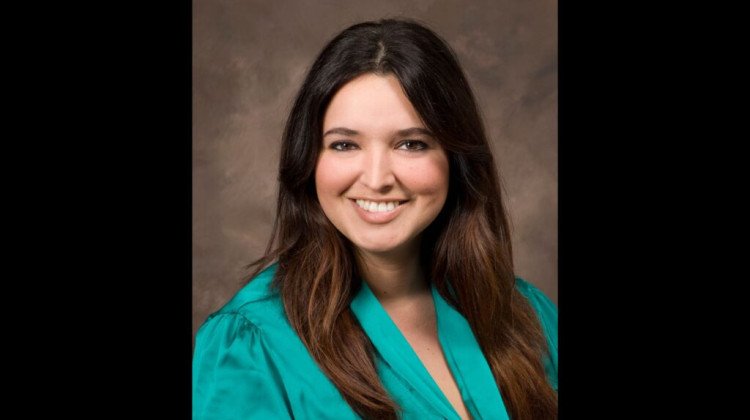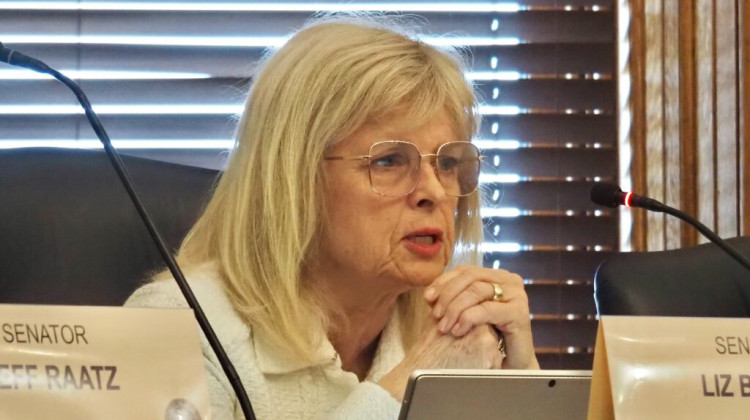
It’s been more than a year since Indiana removed the requirement for a permit to legally carry a handgun.
Justin Hicks/IPB NewsIt’s been more than a year since Indiana removed the requirement for a permit to legally carry a handgun. Some listeners were curious about how the law is impacting Hoosiers.
Although some cities report no significant increases in average shooting totals in the first six months since permitless carry went into effect, experts say they are expecting to see more violence. This is based on preliminary data from national research and state resources.
With this law, those buying handguns from a Federal Firearms License, or FFL, dealer, must still undergo a background check. However, if buying a gun through a private sale, there is no background check required.
There are still prohibited persons who cannot legally carry — such as people convicted of certain violent crimes, and those who do not meet certain age and psychological requirements.
Law enforcement effects
Pierre Atlas is a senior lecturer at Indiana University’s Paul H. O’Neill School of Public and Environmental Affairs. He said this permitless law can complicate procedures for law enforcement.
"Police have to make a quick judgment as to whether or not this person is a potential bad guy or not," Atlas said.
The Indiana Supreme Court ruled several years ago that police cannot ask whether someone is legally carrying a weapon, or take the weapon, unless there is “adequate” suspicion that the person is involved in a crime. The permitless carry law does not change this. It would allow certain Hoosiers who are not prohibited people to still carry a gun and not have a license to provide if police ask to see.
Additionally, Indianapolis Metropolitan Police Department data from earlier this year shows that the number of nonfatal, accidental shootings nearly doubled this February compared to February’s average in the past five years.
Nationwide data shows similar increases in violence for states that relax carrying laws. A 2022 John Hopkins study showed the average rate of firearm assaults increased by an average of more than 9 percent relative to forecasted trends in the first 10 years after seeing relaxed firearm restrictions in more than 34 states.
Join the conversation and sign up for the Indiana Two-Way. Text "Indiana" to 73224. Your comments and questions in response to our weekly text help us find the answers you need on statewide issues.
Atlas is a gun owner. He said without responsible licensing and certain regulations, Hoosiers could see similar trends to this study and more increases in violence.
“I think permitless carry enables irresponsible gun ownership and reckless carrying of firearms and reckless usage,” he said.
Licensing
Atlas said Indiana’s former licensing process was simple — Hoosiers only had to meet “minimum criteria” before obtaining a gun license.
“Many other states that had licenses, that have since gone to permitless carry — many of those other states required training, safety training and even a live fire demonstration that you knew how to shoot a firearm,” he said. “Indiana never had that.”
However, he said this served as a “gatekeeping” function, keeping Hoosiers in check before they bought a weapon.
“Frankly, if you go through the licensing process, you are already thinking more critically about carrying a firearm than if you know that you don't have to do anything and you can just go ahead and get it,” Atlas said.
He added permitless carry is relatively new and took off in the 2010s. Other states, such as Florida, Georgia and Ohio, also have permitless carry laws.
Studies of states that have had permitless carry in place also show 10 years after the adoption of these laws, there is an up-to-15 percent increase in violent crime.
Despite these statistics, Atlas said it would be difficult politically to go back to a licensing process.
“The likelihood of Indiana backtracking on the permitless carry or modifying it or going back to a licensing system, I think politically, that's not very realistic in the near future unless the makeup of the Statehouse changes,” he said.
Public health effects
Jon Macy is an associate professor in the Department of Applied Health Science at the Indiana University Bloomington’s School of Public Health.
He said from a public health standpoint, removing protections such as background checks and firearm safety training will likely increase the possibility of unnecessary gun violence.
“If we're interested in protecting people from unnecessary injury and death, then weakening these kinds of laws is not the right approach,” he said.
Macy said control and regulation on motor vehicle safety is one example of public health restrictions preventing unnecessary death and injury. He said research in this area, and subsequent regulation, led to fewer accidents.
“We said too many people are getting injured and killed in motor vehicle crashes, so we should do something about it,” he said. “And so we did. We have speed limits and safer automobiles and airbags and seatbelt laws and all of these things to keep people safe. And that was based on research that was done to figure out what was going to work.”
He said one major limitation in implementing research-based, gun safety solutions is a ruling that prohibits the Centers for Disease Control and Prevention from using federal money to research gun violence and corresponding statistics.
“One thing that's really slowed us down over the past few decades is that there just hasn't been much research on public health approaches to reducing gun violence,” he said. “And that's because there was this law passed by Congress that was called the Dickey Amendment, which said that no federal money could be used to support research that resulted in any sort of restrictions on gun use.”
The Dickey Amendment prohibited the use of federal funds to “advocate or promote” gun control. The amendment was passed in 1996, and nearly halted all gun violence research.
In 2018, former President Donald Trump signed a bill that clarified this language, saying the CDC did have the authority to conduct research on the causes of gun violence.
Despite this, the lack of research leaves many gaps in the understanding of violence and firearms, as data often lags behind a few years.
Macy said this research and data will be important in coming up with new solutions for increased gun violence.
“I think we can take the same approach with gun violence and come up with research-based solutions that will be effective,” he said.
Many Hoosiers — except for those with a felony conviction, restraining order or serious mental illness — can carry a firearm without a permit. The Indiana State Police recommend Hoosiers obtain a permit to carry a weapon if they are not certain whether they fall into a prohibited person category.
CORRECTION: A previous version of this story said police weren't allowed to ask for someone's gun permit after the permitless carry law went into effect. That was incorrect. Police have been prohibited from asking for someone's gun permit since a ruling from a 2017 lawsuit.
Violet is our daily news reporter. Contact her at vcomberwilen@wfyi.org or follow her on Twitter at @ComberWilen.
 DONATE
DONATE






 Support WFYI. We can't do it without you.
Support WFYI. We can't do it without you.